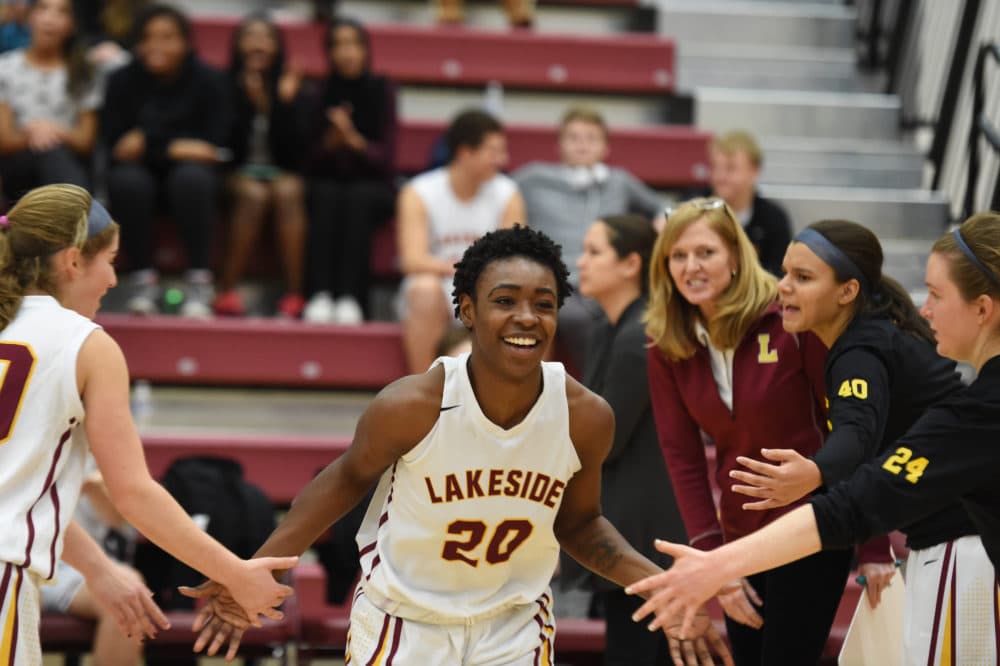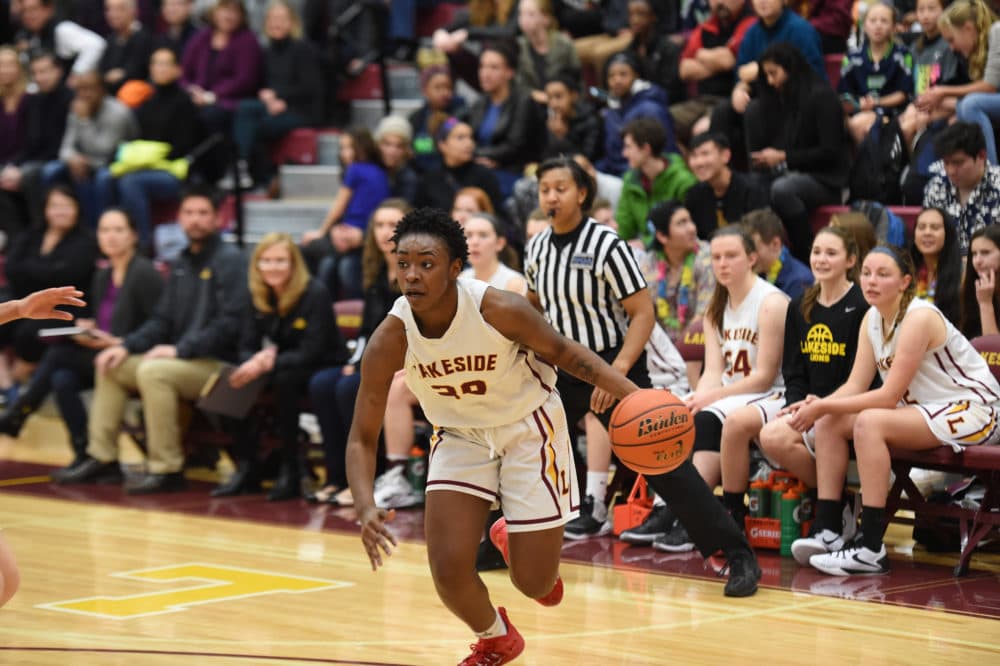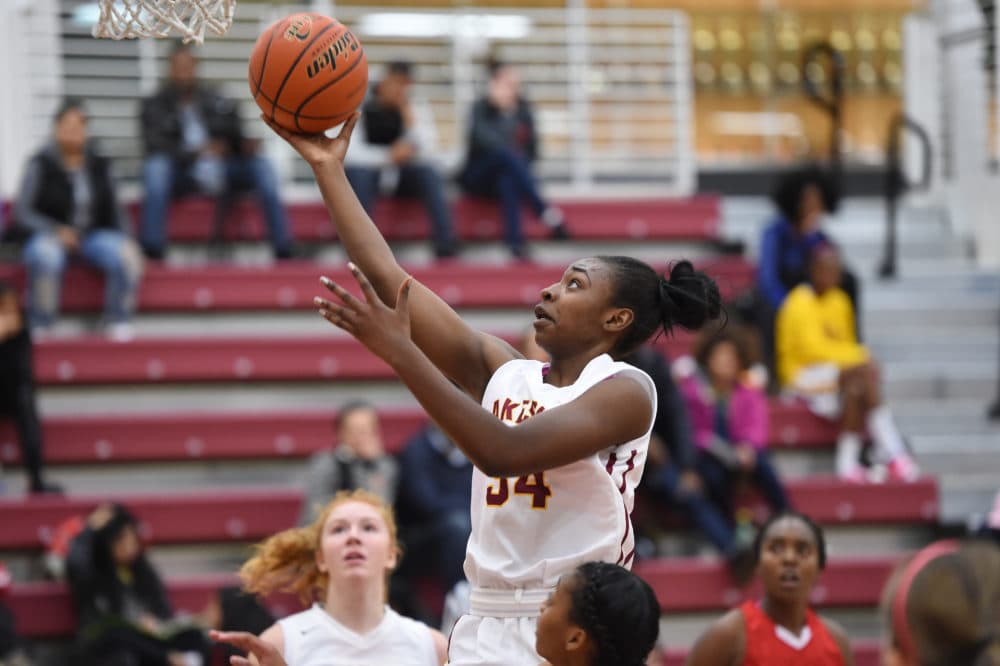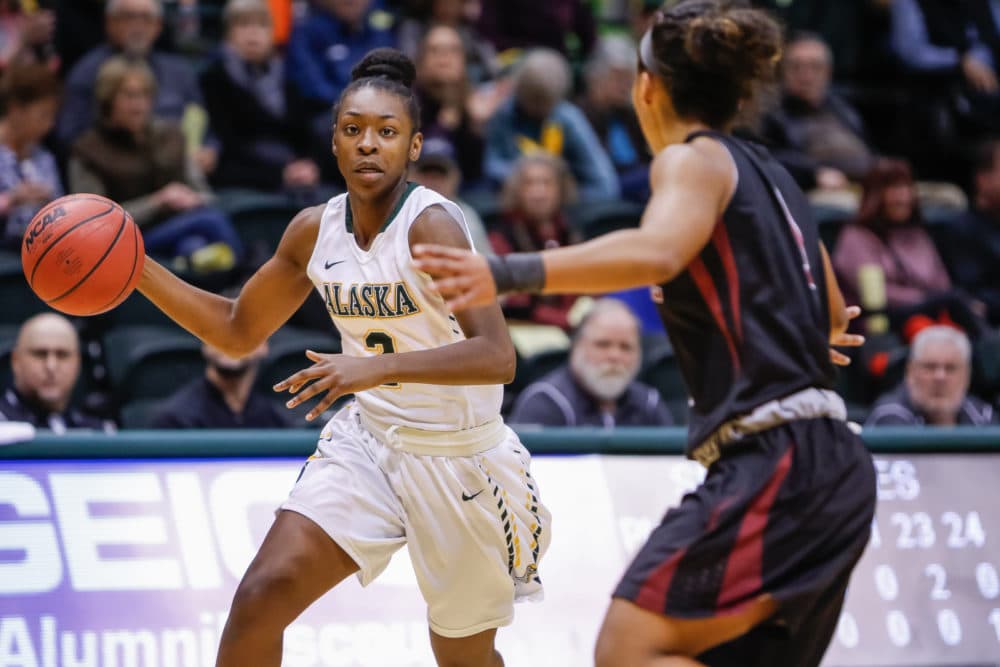Advertisement
Former H.S. Hoops Star On Race, Education — And Her Vision For A Better School
Resume
For much of the month of June, the area around Seattle’s Cal Anderson Park was a protest zone.
Weeks before Cal Anderson Park became the center of Seattle’s Black Lives Matter movement, it was the place where former high school basketball star Kimijah King agreed to sit down for an interview.
Kimijah hasn’t been participating in recent protests. She says she’s too angry, and she worries the protests could trigger her trauma.
But recently, Kimijah has been dreaming of a different way of bringing about change. And it all started … with basketball.
'I Like Going Hard'
Kimijah King’s the oldest of six girls.
"I remember moving just about every year when I was in elementary school," she says. "And, in middle school, I remember having to live with my dad’s mom, because we were technically homeless."
Kimijah had a lot of responsibilities growing up.
She says she was in third grade when she started cooking for herself.
"There was never an expectation in the house that my mom would cook," Kimijah says. "She would say, 'Go in the kitchen and find what you can find.' Most times there wasn’t anything to find, but if we did there was just the expectation that we would have to make it for ourselves."
"I like going hard. ... That’s why I like the game so much. I can be aggressive and I can let out anger and I can just, you know, let things go."
Kimijah King
To distract herself from the problems at home, Kimijah played playground basketball.
"I like going hard, just going full-speed, passing people, beating people off the dribble," she says. "That’s why I like the game so much. I can be aggressive, I can let out anger and I can just, you know, let things go."
She also liked hearing smack talk from her opponents — because, she says, that meant she was doing well.
"It makes you feel good," she says.

In second grade, one of Kimijah’s friends told her he was on a basketball team.
"And I was like, 'What? You’re on a basketball team?' " Kimijah recalls. "I didn’t have any idea that you could be on a basketball team. And so I asked my mom if I could be on a basketball team."
So Kimijah’s mom signed her up for a team at a community center. In middle school, she joined an AAU team. She was talented.
And not just on the court: She was in all honors classes, and it was easy for her to get straight A's. Her English teacher recognized her potential and took her to visit two of Seattle’s top private high schools: Lakeside and University Prep.
"And I didn’t actually like Lakeside very much. I wanted to apply to University Prep, because the classes were smaller," Kimijah says. "But also they had a nice ice cream bar. And I was like, 'Wow, this is nice. I can have ice cream whenever I want.' "
But then a friend pointed out University Prep played sports in the 1A league, against other small high schools with only a few hundred students. Even though Lakeside was also a small school, it played in the more competitive 3A league, against schools more than twice its size.
"I’d rather play 3A against better competition, instead of playing 1A against smaller schools. And so that was the ultimate decision," she says.
There was one more hurdle: At the time, Lakeside required an application essay from parents. At first, Kimijah’s mom didn’t want to write one.
"She looked at the price tag, and she thought it was crazy. She was like, 'Why do you want to go to this school?' " Kimijah recalls.
Kimijah and her English teacher convinced her mom that, if she got in, she’d get financial aid. So her mom agreed to write the essay.
Lakeside
In 2012, Kimijah got into Lakeside on the strength of her academics alone. Lakeside doesn’t consider athletic ability in admissions.
"When I first saw the campus, I couldn’t even believe that it was a high school," Kimijah says. "I was actually really confused, because it looks like a college campus. When they told me that they had free periods, that you could use a free period to study with the tutor, or do homework, and that no one would be keeping tabs on you, or that you could use your phone in between classes, I was like, 'What kind of place is this?'
"And everyone has laptops. And so I was like, 'Oh, man, I’m going to look like an idiot. I don’t know how to work a laptop.' Everyone was going from building to building for classes and I was like, 'How do you know where you’re going?' "
From the start, Kimijah had trouble making friends.
"You come in as this brown girl who is completely different, has a different culture. No one’s asking you about yourself," Kimijah says.
Kimijah remembers one time, in a freshman history class, when she tried to contribute to the conversation.
Her classmates treated her as if she was dumb, and the teacher didn’t do anything about it.
"And I was like, 'Well, if my teacher’s not going to say anything then I just won’t to talk anymore,' " she says. "And so I stopped talking in class after that because I didn’t feel safe to speak."
One day, the topic of slavery came up in her history class, and one of her classmates...
"He was defending why white people believed that Black people were dumber," Kimijah recalls. "He was like, 'Well, there was actually scientific studies that were coming out.' And yes, that’s true — but don’t defend that point. That’s completely ridiculous. I’m freaking human just like you; there is no difference."
Kimijah says the curriculum didn’t include anything about contributions of people of color in society.
"I didn’t feel like people kind of understood what I was going through, because Lakeside kids don’t have the same problems that I have."
Kimijah King
And, during Kimijah’s junior year, all they did during Black history month was show a video in assembly.
Kimijah says that’s when she lost all motivation to work hard in school.
"I didn’t feel like people kind of understood what I was going through, because Lakeside kids don’t have the same problems that I have," she says. "So who can I talk to? Who’s going to understand why I’m coming to school late every day? People didn’t want to be in projects with me. They thought I was a bad student, but I was just dealing with my own problems."
Kimijah’s family was homeless part of the time, living in their car.
When they did have a home, the seven of them shared a two-bedroom apartment — Kimijah’s mom in one room and all six girls in the other.
Kimijah says, at one point, she visited the house of one of her classmates on the way to a school dance.
"And I saw her home, which looked like a castle. And they had a boat out in front," Kimijah recalls. "And I was like, 'Whoa, things are very different for us.' Like, I’m just worried about simple things, like having toiletries or getting a meal, and you have a castle."
Basketball As Distraction
Kimijah says, at her home, there was no quiet place to do her homework.
"It’s really stressful when all you can think about is just trying to survive."
Kimijah King
"It’s really stressful when all you can think about is just trying to survive," she says. "It’s just worry, worry, worry, for the most part. How am I supposed to do well in school when I have to worry about cleaning my mom’s house all the time, and making myself dinner, or worrying about if I’m even going to have dinner?"
Lakeside did try to help.
They included lunch in Kimijah’s scholarship and started including extra meals when they figured out she needed breakfast and after-school snacks, too.
Kimijah was also dealing with the trauma from being sexually abused, and Lakeside got her a counselor.
"I would be a different person if I hadn’t gone to Lakeside," she says. "I had so much support that my siblings didn’t have."

And Kimijah also had basketball.
"Playing basketball helps you keep your mind off of things, because you have all this stress from school," she says. "You don’t have to think as much as you would if you were in class, especially at Lakeside. You can just have fun, play basketball."
Kimijah’s really fast and was used to just blowing by people and getting layups.
But, this one time, she had a defender on her that she just couldn’t shake.
"It was like, dribble, dribble, between the legs, behind the back, step back. Step back is kind of a shifty move, so people are always caught off guard."
The person guarding Kimijah fell.
" 'Oh, wow, I’m open,' " Kimijah remembers thinking. " 'I’m gonna shoot it.' Shot the ball. Swished it. I was like, 'Oh, s---, look at me, OK.' My boyfriend showed me a video of everyone screaming.
"When people come up to me after the game, it’s like, 'Oh, you’re so exciting to watch. You’re so explosive. You make it look easy. You do all these really cool moves.' I’m like, 'Oh, thanks.' I’m glad that people can understand my joy — the way that I feel, I can make them feel also, the way I play."
As time went on, Kimijah started putting more and more into basketball.
"My parents — they both didn’t go to college, so it’s not like they were going to help me with the process, or make sure that I was turning things in on time," Kimijah says. "That’s why I didn’t really focus on academics that much at Lakeside. I’m was like, 'I’m just trying to get a basketball scholarship.' "

She did get a basketball scholarship to play at University of Alaska in Anchorage, a Division II school.
But, after a year, she returned to Seattle.
Now she’s focused on another dream. It’s an idea that came to her during her senior year of high school. She was writing a paper about what it meant to her to be Black.
"I just started thinking about Black empowerment and how unempowered I felt at Lakeside," she says.
Kimijah started thinking about all the support she got at Lakeside, and how important that was to her, but also ways the school could have done better.
"And I was like, 'Wow, like, I’m into education; I want to start a school,' " she says.
Changes At Lakeside
Lakeside is working to be more welcoming for students of color and students from poor families.
The school got rid of the admissions essay for parents to make it easier on students like Kimijah.
Jamie Asaka is the school’s director of equity and inclusion, and she’s an alumna herself.
"I had a very challenging experience at Lakeside," Jamie says. "I came from a public school. There were very few of us that came from a public school. I identified as a student of color. There were very few of us who identified as a student of color. My family also had — we experienced some hardships, and I did not feel like a lot of people in the community experienced similar hardships."
Jamie says, Lakeside now provides additional help for students who need it, including home internet and passports for students who want to go on the school’s international service trips.
She’s started an alumni mentoring program for Black students.
And she says Lakeside has also changed its hiring practices to try to attract a more diverse pool of job candidates.
On top of that, she adds, the school’s trying to train teachers to better moderate conversations like the one where Kimijah felt attacked by her classmates when they treated her like she was dumb.
"We came up with a training for — a two-day training for our colleagues so that they are equipped when a student expresses an opinion or a belief perceived as controversial," Jaime says.
Kimijah's Plan
As for Kimijah, she’s taking online college classes and working as an Amazon delivery driver to make ends meet.
And, while she hasn’t joined the protests in Seattle, Kimijah says she’s glad they’re happening.
She says different people have different roles to make sure the change the protestors are demanding becomes long-lasting.
Kimijah feels her role is starting a school — like Lakeside in terms of its resources for students, but with a curriculum that focuses more on the contributions of people of color.
She believes she’s the person for the job.
"That’s all I think about these days, is starting a charter school," she says.
Kimijah King still plays some pick-up basketball but, for the most part, it’s not that big a part of her life anymore.
It’s just how she got to where she is now.
This segment aired on July 18, 2020.